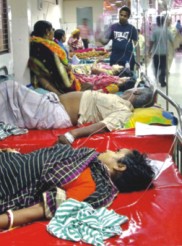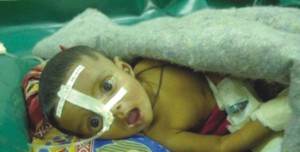|
Health
When Diarrhoea Strikes
 Acute diarrhea is something nearly everyone has experienced at one time or another. The loose, watery stools and abdominal cramps that characterize diarrhea usually last a couple of days. Diarrhea often means more-frequent trips to the toilet and a greater volume of stool. Acute diarrhea is something nearly everyone has experienced at one time or another. The loose, watery stools and abdominal cramps that characterize diarrhea usually last a couple of days. Diarrhea often means more-frequent trips to the toilet and a greater volume of stool.
By definition, chronic diarrhea lasts much longer than does acute diarrhea, generally longer than four weeks. It can be a sign of a serious disorder, such as inflammatory bowel disease, or a less serious condition, such as irritable bowel syndrome.
Diarrhea may cause a loss of significant amounts of water and salts. Most cases of diarrhea clear on their own without treatment. But see your doctor if diarrhea persists, if you become dehydrated or if you pass blood in your stool.
Diarrhoea kills over 1 million children every year through dehydration and malnutrition. Children are more likely than adults to die from diarrhoea because they become dehydrated more quickly. About one in every 200 children who contract diarrhoea will die from it.
Diarrhoea is caused by germs that are swallowed, especially germs from faeces. This happens most often where there is unsafe disposal of faeces, poor hygiene practices or a lack of clean drinking water, or when infants are not breastfed. Infants who are fed only breastmilk seldom get diarrhoea.
Signs and symptoms associated with diarrhea may include:
* Frequent, loose, watery stools
* Abdominal cramps
* Abdominal pain
* Fever
* Blood in the stool
* Bloating
In addition, other signs and symptoms such as nausea and vomiting may precede diarrhea that's caused by, for example, an infection. Bacterial or parasitic infections sometimes cause bloody stools, and fever may accompany these infections as well.
If you are an adult, see your doctor if:
Your diarrhea persists beyond three days
You become dehydrated as evidenced by excessive thirst, dry mouth or skin, little or no urination, severe weakness, dizziness or lightheadedness, or dark-colored urine
You have severe abdominal or rectal pain
You have bloody or black stools
You have a temperature of more than 102 F (39 C), or signs of dehydration despite drinking plenty of liquids
In children, particularly young children, diarrhea can quickly lead to dehydration. Call your doctor if your child's diarrhea doesn't improve within 24 hours or if your baby:
 Hasn't had a wet diaper in three or more hours Hasn't had a wet diaper in three or more hours
Has a fever of more than 102 F (39 C)
Has bloody or black stools
Has a dry mouth or cries without tears
Is unusually sleepy, drowsy, unresponsive or irritable
Has a sunken appearance to the abdomen, eyes or cheeks
Has skin that doesn't flatten if pinched and released
Normally, the food you eat remains in liquid form during most of the digestive process. When the unabsorbed food residue passes through your colon, most of the fluids are absorbed and what remains is a semisolid stool.
In diarrhea, the food and fluids you ingest pass too quickly or in too large an amount or both through your colon. The fluids aren't sufficiently absorbed, and the result is a watery bowel movement. In addition, the lining of your colon may be inflamed or diseased, making it less able to absorb fluids.
The most common causes of diarrhea include:
Viruses. Common viruses that cause diarrhea are Norwalk virus, cytomegalovirus, viral hepatitis and the herpes simplex virus. Rotavirus is the most common cause of acute childhood diarrhea. Viral diarrhea spreads easily.
Bacteria and parasites. Contaminated food or water can transmit bacteria and parasites to your body. Parasites such as Giardia lamblia and cryptosporidium can cause diarrhea. Common bacterial causes of diarrhea include campylobacter, salmonella, shigella and Escherichia coli. Diarrhea caused by bacteria and parasites can be common when traveling in developing countries, and is often called traveler's diarrhea.
Medications. Many medications can cause diarrhea. The most common are antibiotics. Antibiotics destroy both good and bad bacteria, which can disturb the natural balance of bacteria in your intestines. This disturbance sometimes leads to an infection with bacteria called Clostridium difficile, which can also cause diarrhea.
Most cases of diarrhea clear on their own within a couple of days without treatment.
Medications
If a parasitic infection is causing your diarrhea, prescription antibiotics may ease your symptoms. Antibiotics sometimes, but not always, help ease signs and symptoms of bacterial diarrhea. However, antibiotics won't help viral diarrhea.
Therapies include paying attention to key areas:
Replacing fluids. If you seek medical attention, your doctor likely will advise you to take steps to replace the fluids and salts lost during diarrhea.
Your body needs adequate levels of salts and electrolytes minerals such as sodium and potassium in order to maintain the electric currents that keep your heart beating. Disruption of your body's fluid and mineral levels creates an electrolyte imbalance. Unless restored by replacing fluids and drinking an electrolyte mixture, this imbalance can be serious.
Adjusting medications you're taking. If your doctor determines that an antibiotic medication caused your diarrhea, you'll need to stop taking that medication and modify your treatment plan.
Treating underlying conditions. If you have chronic diarrhea, treating the underlying disease may help ease your diarrhea.
Take these measures to prevent dehydration and reduce symptoms while you recover:
* Drink plenty of clear liquids, including water, broths and juices every day. But, avoid apple and pear juices until you feel better because they can make your diarrhea worse. Avoid caffeine and alcohol. Eating gelatin may also help.
*Add semisolid and low-fiber foods gradually as your bowel movements return to normal.
* Try soda crackers, toast, eggs, rice or chicken.
* Avoid certain foods such as dairy products, fatty foods, high-fiber foods or highly seasoned foods for a few days.
* Adapted from the Mayo Clinic
Copyright
(R) thedailystar.net 2009 |
